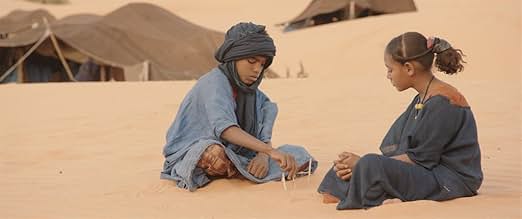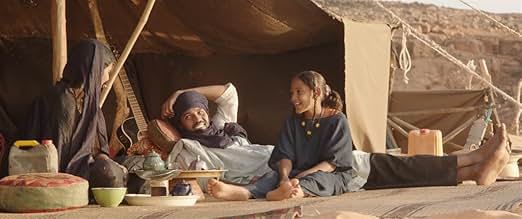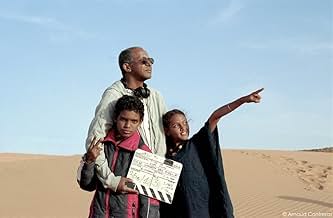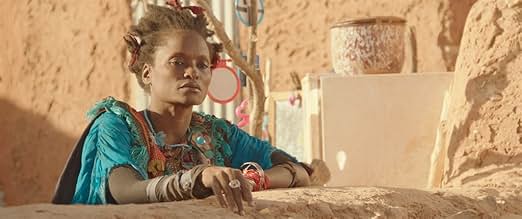CALIFICACIÓN DE IMDb
7.1/10
19 k
TU CALIFICACIÓN
Un pastor y su familia residen en las dunas de Tombuctú. Sus tranquilas vidas - normalmente libres de jihadistas determinados en controlar su fe - se ven repentinamente trastornadas.Un pastor y su familia residen en las dunas de Tombuctú. Sus tranquilas vidas - normalmente libres de jihadistas determinados en controlar su fe - se ven repentinamente trastornadas.Un pastor y su familia residen en las dunas de Tombuctú. Sus tranquilas vidas - normalmente libres de jihadistas determinados en controlar su fe - se ven repentinamente trastornadas.
- Dirección
- Guionistas
- Elenco
- Nominado a 1 premio Óscar
- 33 premios ganados y 28 nominaciones en total
Ibrahim Ahmed
- Kidane
- (as Ibrahim Ahmed dit Pino)
Yoro Diakité
- Djihadiste
- (as Yoro Diakite)
Weli Kleïb
- Juge
- (as Weli Cleib)
- Dirección
- Guionistas
- Todo el elenco y el equipo
- Producción, taquilla y más en IMDbPro
Opiniones destacadas
At the end of Woody Allen's Bananas, the leader of the successful Latin American revolution starts making crazed pronouncements: "The official language of the country will be Swedish! Everyone must change their underwear every day, and wear it on the outside so we can check!" That's kind of what happens when the jihadists come to town in Timbuktu, only its tragic, not funny. A bunch of mostly foreigners with AK-47s show up in a Muslim community, tell all the locals they're not Muslim enough, and oh, by the way, use the Qaran to justify taking anything they feel like taking, including marriageable young women. You come away with a sense of what it feels like for ordinary people to live through this, and it's not pretty at all.
"Timbuktu" is a brave film from Mauritania that shows what it's like in a small African town after it's been taken over by Jihadists determined to enforce Sharia Law. However, I should warn you--the film is far from enjoyable and seems rather hopeless and it also lacks the usual resolution you'd expect in a movie. This is not a criticism, as giving it a happy ending would have been ridiculous.
The film shows a variety of scenarios in which harsh Muslim law is implemented. Having fun of any type seems illegal--no singing, no music, no playing soccer...nothing. In addition, a man kills another man in self-defense and is brought to this tribunal...and his family is now left defenseless without a man to protect him.
Considering the film's pedigree, it is amazingly professional looking. The music is excellent and haunting, the acting very natural. Overall, a sad but intense drama that shows a slice of life...a very ugly slice.
The film shows a variety of scenarios in which harsh Muslim law is implemented. Having fun of any type seems illegal--no singing, no music, no playing soccer...nothing. In addition, a man kills another man in self-defense and is brought to this tribunal...and his family is now left defenseless without a man to protect him.
Considering the film's pedigree, it is amazingly professional looking. The music is excellent and haunting, the acting very natural. Overall, a sad but intense drama that shows a slice of life...a very ugly slice.
One of the movies that's still in the running for a "Best Foreign Language Film" Oscar nomination, is Timbuktu. Together with the Estonian Mandariinid it's one of my favorites for this year's Academy Awards, but I'm afraid only one of them will make it to the shortlist and neither of them will eventually win the Oscar. Not while movies like Ida, Turist and Leviathan are their competitors (although I think Timbuktu and Mandariinid are better than those three). The thing about Timbuktu that makes it such a beautiful picture, is its, what I presume, authentic representation of Muslims and the different views on Islamic religion. Spoken in a number of languages, from French and English to Arabic and a wide diversity of African languages (Tamasheq, Bambara and Songhay), Timbuktu shows Westerners a part of the world we almost know nothing about. Apart from judgemental and arrogant claims about the (religious) backwardness of many people there, be they Berber or Bedouin, many people here just don't know what to say about the Northern part of Africa. Director Abderrahmane Sissako gives us lots of stuff to talk and think about (for example the use of "jihad" as on the one hand an inner struggle (the greater jihad) and on the other hand an external holy war which is fought by mujahideen - the second jihad being the one we fear and loathe so much in the West). Not only that, but together with his cinematographer Sofian El Fani (La Vie d'Adèle) he manages to provide us with wonderful visual poetry and exceptional sceneries of south-east Mauritania. While it took some getting used to the narrative and the editing, I was full of awe after enjoying this utterly majestic work of art. Highly recommended!
For someone raised in Mauritania as I was, it was quite something to watch the first Mauritanian movie nominated for a Foreign Film Oscar. I saw it in, of all places, in a movie theatre in Rio de Janeiro, the first week of its release in Brazil.
The language of cinema is truly universal as you see people who belong to an entirely different culture react in a similar way to someone from that culture. Of course there are some references not easy to get, such as the one to music lauding the Prophet by Mauritanian female artist Dimi mint Abba which is heard in a key scene showing how absurd these Islamists' prohibitions are.
Unsure, also, whether people can tell when different actors use different languages (Arabic, Tuareg, Bambara etc.).
The soccer game scene is one of the best I saw this year on the big screen, and the one with the killing of astounding beauty.
Definitely a great director at work here, despite obvious limited resources.
The language of cinema is truly universal as you see people who belong to an entirely different culture react in a similar way to someone from that culture. Of course there are some references not easy to get, such as the one to music lauding the Prophet by Mauritanian female artist Dimi mint Abba which is heard in a key scene showing how absurd these Islamists' prohibitions are.
Unsure, also, whether people can tell when different actors use different languages (Arabic, Tuareg, Bambara etc.).
The soccer game scene is one of the best I saw this year on the big screen, and the one with the killing of astounding beauty.
Definitely a great director at work here, despite obvious limited resources.
"Timbuktu" (2014 release from Mauritania; 99 min.) brings the story (fictional, by influenced by real events) of how the Mali town copes with the 'liberation' by jihadis. As the movie opens, we see the jihadis having a shooting practice by destroying the local wood statutes. The jihadis issue all kinds of rules ("smoking is forbidden! music is forbidden!"), much to the irritation of the local Mali population. We get to know one local family in particular, a husband and wife with their 12 yr. old daughter. They live a bit outside of the city center where the desert takes over, going about their daily business as best as possible. Then one day, one of the husband's cow accidentally destroys the fishing nets of the fisherman, who promptly kills the cow. The husband decides that he cannot tolerate this. To tell you more would spoil your viewing experience, you'll just have to see for yourself how it all plays out.
Couple of comments: first, it is a small miracle that a movie like "Timbuktu" could even have been made. Writer-director Abderrahmane Sissako shot the movie in Mauritania, which subs for Mali, but let's not kid ourselves. Mauritania is an "Islamic Republic", so it was no easy feat to shoot there either. Second, Sissako demonstrates again and again how much the local population resends the jihadis for uprooting their lives. There are several scenes in which a local man pleads with the jihadis ("where is forgiveness? where is leniency?"), to no avail of course. Playing soccer will cost you 20 leashes. Playing music comes at 40 lashes. Being in the room with someone from the opposite sex is another 40 lashes, and on and on. The fact that the neither side can understand the other (they speak Tamasheq in Timbuktu, the jihadis mostly speak Arabian, some also speak French or English) only makes the entire situation even more absurd. Second, while there are some shocking scenes in the movie, overall this is not a violent or graphic film. Almost on the contrary, in that the movie's editing and photography is done in such a way that it induces a false sense of peace and security. The photography in particular is pure eye-candy. Third, I have no idea where Sissako found these performers, but there are some wonderful performances, in particular from the wife and the 12 yr. old daughter. Bottom line: there is a good reason why this film is nominated for the Best Foreign Language Oscar, as it is a deeply moving film that will stay with you long after you have seen it.
The movie finally opened this weekend at my local art-house theater here in Cincinnati, and I went to see it right away. The matinée screening where I saw this at today was attended okay but not great, although I'm hoping that the bitter cold weather is a factor for that. If you like a top-notch foreign film that provides a glimpse of what real life under jihad is like, you cannot go wrong with this. "Timbuktu" is HIGHLY RECOMMENDED!
Couple of comments: first, it is a small miracle that a movie like "Timbuktu" could even have been made. Writer-director Abderrahmane Sissako shot the movie in Mauritania, which subs for Mali, but let's not kid ourselves. Mauritania is an "Islamic Republic", so it was no easy feat to shoot there either. Second, Sissako demonstrates again and again how much the local population resends the jihadis for uprooting their lives. There are several scenes in which a local man pleads with the jihadis ("where is forgiveness? where is leniency?"), to no avail of course. Playing soccer will cost you 20 leashes. Playing music comes at 40 lashes. Being in the room with someone from the opposite sex is another 40 lashes, and on and on. The fact that the neither side can understand the other (they speak Tamasheq in Timbuktu, the jihadis mostly speak Arabian, some also speak French or English) only makes the entire situation even more absurd. Second, while there are some shocking scenes in the movie, overall this is not a violent or graphic film. Almost on the contrary, in that the movie's editing and photography is done in such a way that it induces a false sense of peace and security. The photography in particular is pure eye-candy. Third, I have no idea where Sissako found these performers, but there are some wonderful performances, in particular from the wife and the 12 yr. old daughter. Bottom line: there is a good reason why this film is nominated for the Best Foreign Language Oscar, as it is a deeply moving film that will stay with you long after you have seen it.
The movie finally opened this weekend at my local art-house theater here in Cincinnati, and I went to see it right away. The matinée screening where I saw this at today was attended okay but not great, although I'm hoping that the bitter cold weather is a factor for that. If you like a top-notch foreign film that provides a glimpse of what real life under jihad is like, you cannot go wrong with this. "Timbuktu" is HIGHLY RECOMMENDED!
¿Sabías que…?
- TriviaIn 2015 Timbuktu became the first film shot in Mauritania by a Mauritanian director to win at the Cesar film awards. It won seven awards out of its eight nominations including Best Film, Best Director, Best Original Screenplay, Best Editing, Best Cinematography, Best Music and Best Sound, thus setting the record for being the African film with the most awards ever.
- ErroresIn the stoning scene, both man and woman are buried up to their necks. In a proper Islamic stoning (rajm), the woman should only be buried up to her waist.
- ConexionesFeatured in The Oscars (2015)
- Bandas sonorasShooting The Statues
Composed, Arranged and Orchestrated By Amine Bouhafa
with The City of Prague Philharmonic Orchestra
© 2014 Universal Music France
Selecciones populares
Inicia sesión para calificar y agrega a la lista de videos para obtener recomendaciones personalizadas
- How long is Timbuktu?Con tecnología de Alexa
Detalles
- Fecha de lanzamiento
- Países de origen
- Sitios oficiales
- Idiomas
- También se conoce como
- Timbuktu
- Locaciones de filmación
- Oualata, Mauritania(as Timbuktu)
- Productoras
- Ver más créditos de la compañía en IMDbPro
Taquilla
- Total en EE. UU. y Canadá
- USD 1,076,075
- Fin de semana de estreno en EE. UU. y Canadá
- USD 45,110
- 1 feb 2015
- Total a nivel mundial
- USD 7,179,391
- Tiempo de ejecución
- 1h 36min(96 min)
- Color
- Relación de aspecto
- 2.35 : 1
Contribuir a esta página
Sugiere una edición o agrega el contenido que falta














